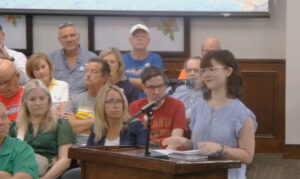The Peachtree City Water and Sewer Authority voted Monday to refinance its bonds to save money for ratepayers.
While the move would save as much as $1.3 million, it also puts the WASA board in a position to potentially abandon an agreement with the city that effectively gives the city council a veto power over any extension of the sewer system beyond the city limits.
There are no pending proposals to extend sewer service outside of the city, and the prospects for doing so aren’t promising, said WASA General Manager Stephen Hogan.
“We have no active requests, and we’re not looking to expand, because that costs money,” Hogan said.
WASA’s vote to refinance the bonds did not include a provision to abandon the intergovernmental agreement with the city, Hogan said. But the topic is clearly on the table and has city officials squirming and scrambling behind the scenes for a way to one-up the WASA board and preserve the city’s veto power.
Part of the reason WASA voted on the matter Monday was due to an urgency to refinance before interest rates went back up, Hogan said, noting that WASA had not heard back from the city on WASA’s request to have the city back the bonds but eliminate the sewer extension veto from the agreement.
WASA Chairman Mike Harman contended last month that over the past few years the city has turned down sewer extensions to Senoia and unincorporated Coweta County that would have provided significant revenue. Revenue is a pretty big deal to WASA because it does not survive on tax dollars but instead is funded by ratepayers.
With revenue declining in part due to the loss of Photocircuits, one of WASA’s largest customers, the authority last year raised rates by an average of about $20 per month for homeowners while also enacting a rate increase on commercial and industrial customers. Instead of making the decisions based on WASA’s financial health, the city council instead based its rationale on the theory of controlling growth in Coweta County, Harman noted.
In the case of Senoia, it backfired because the city ultimately built a new sewer treatment plant that gave it far more capacity than the proposed agreement with WASA.
WASA stands to take a bit of a financial hit by refinancing on its own without the backing of the city and its outstanding credit rating. Without the city, WASA will have to set aside a $1.8 million debt service reserve fund with cash it currently has available for any contingency.
On the flip side, if the city backs WASA’s bonds, that debt service reserve fund won’t be needed, and the savings rises from $1.3 million to $1.8 million due to a better interest rate, officials have said.
The vote Monday to refinance the bonds without the city’s assistance was 2-1, with WASA members Mike Harman and Tim Meredith voting in favor and member Phil Mahler voting against. Although WASA has five board members, the bylaws require a majority of the quorum present for any vote to pass.
Hogan noted that the authority has been working toward refinancing its bonds for the past three years.
Meantime, other sewer system operators are looking at WASA’s robotic sewer line inspection program.
This summer, PCWASA officials have welcomed visitors from the governments of Garden City, Ga., as well as the city of Columbus and Augusta Utilities. They all have come to ask questions about the use of RedZone’s robotics technology, while observing the efficiency and accuracy of RedZone robots in the field.
At present, these technological innovations are busy rolling through the PCWASA sewer lines and collection mains to inspect the structural integrity of the Authority’s infrastructure that serves approximately 11,000 customers.
During the PCWASA August board meeting, Keisha Lisbon Thorpe, the authority’s division manager of technical services, reported that the RedZone project was well ahead of schedule and past the halfway point, as work has been “progressing along nicely and without incident,” she noted.
The RedZone robots have been averaging data collection on approximately 5,700 linear feet per day, a pace even more efficient than originally anticipated. To date, the robotics technology has inspected approximately 470,000 linear feet of sewer lines; as a result, RedZone has completed 58 percent of the project, several months in advance of where the project was expected to be at this point.
The Authority joined forces earlier this year with RedZone Robotics, a contractor located in Pittsburgh, Penn., which is a hotbed of robotics research and development. Their work featuring the RedZone Solo Unmanned Inspection Robots, which are lightweight systems with onboard intelligence and full coverage tracking, began in mid-April. The robots are able to collect data at such a rate that their efficiency and accuracy is unmatched in the industry, say Authority officials. What will take the robots to collect and inspect in a year, would take more than a decade to accomplish via other conventional data collection and inspection methods, such as manual review or televising lines.
Within the terms of the contract between PCWASA and RedZone, the work has been scheduled for seven days per week, from 7 a.m. to 7 p.m. Having completed more than half of the inspection and data collection already, the project is on pace to be completed several months prior to the 15-month original timeline.










Leave a Comment
You must be logged in to post a comment.